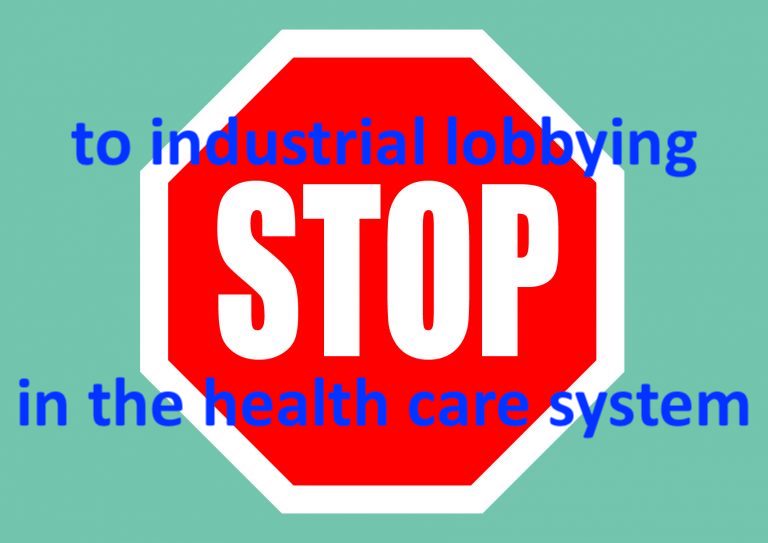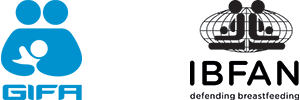
Several associations of healthcare professionals (doctors, midwives, lactation consultants, paediatricians) from around the world have signed a motion calling for an end to corporate sponsorship of breast-milk substitutes. This sponsorship includes advertising, but also the funding of conferences, training courses and publications. The Lancet, Global health leaders call for end to formula company sponsorship (9 mars 2024).
In parallel with the Lancet appeal, La Revue du Praticien has just published an article entitled « Stop au lobbying des industriels de laits infantiles ! » /”Stop the lobbying of infant milk manufacturers” (28 March 2024).
Key points
- Manufacturers are taking advantage of parents’ concerns and spreading misleading messages about the benefits of their products to the detriment of breastfeeding.
- The communication strategies of manufacturers of breast-milk substitutes (BMS) are akin to a disinformation operation, the workings of which were described in 2023 in two of the most eminent international scientific journals: The Lancet1 and The British Medical Journal (BMJ)2.
- The aim of the industry is to gain market share at the expense of breastfeeding, which, as the authors of The Lancet point out, science has proven to be beneficial for both children (reduced risk of mortality, infectious diseases, chronic diseases, obesity, etc.) and mothers (reduced risk of breast and ovarian cancer, type 2 diabetes, cardiovascular disease, etc.).
1 The Lancet https://www.thelancet.com/series/Breastfeeding-2023 (2023)
2 The British Medical Journal (BMJ) Cheung et al https://pubmed.ncbi.nlm.nih.gov/36792145/
The Lancet, Global health leaders call for end to formula company sponsorship Correspondence to The Lancet highlights ‘aggressive marketing’ by manufacturers of commercial milk formula https://www.thelancet.com/pdfs/journals/lancet/PIIS0140-6736(24)00242-3.pdf (9 mars 2024)
Call to end sponsorship from commercial milk formula companies
We, the undersigned representatives of health-care professional associations (HCPAs), call upon all HCPAs to bring an end to sponsorship relationships with companies that market breastmilk substitutes.
Since 1981, WHO has repeatedly called for restrictions on the marketing of breastmilk substitutes.(1) In 2016, the World Health Assembly called on member states to end the inappropriate promotion of foods for infants and young children, including breastmilk substitutes, to health-care professionals.(2) The WHO Guidance on Ending the Inappropriate Promotion of Foods for Infants and Young Children recommends that HCPAs should not allow “such companies to sponsor meetings of health professionals and scientific meetings”.
There is compelling evidence that aggressive marketing by manufacturers and distributors of breastmilk substitutes adversely affects feeding practices for infants and young children.(3) Such marketing undermines breastfeeding and contributes to poor health outcomes in children. It also contributes to the burden of non- communicable disease, particularly among women.(4)
Sponsorship of HCPA educational events is a marketing activity that creates conflicts of interest among health-care professionals. Conflicts of interest have been defined as “[S]ituations where an individual has an obligation to serve a party or perform a role and the individual has either: 1) incentives or 2) conflicting loyalties, which encourage the individual to act in ways that breach his or her obligations.”(5) Sponsorship of educational events influences many activities, including research and prescribing behaviour, even when health-care professionals do not recognise this influence.(6)
The WHO Guidance on Ending the Inappropriate Promotion of Foods for Infants and Young Children cautions health-care professionals and HCPAs to be aware that our credibility will be damaged if we continue to accept funding from companies that promote breastmilk substitutes and other foods for infants and young children.
As HCPAs, we seek to protect, promote, and support optimal feeding for infants and young children. Manufacturers and distributors of breastmilk substitutes, on the other hand, have a fiduciary duty to increase their profits through increasing sales and, therefore, increasing use of breastmilk substitutes. These different missions clearly cannot be reconciled.
We therefore call upon all HCPAs to commit to ending sponsorships from companies that market breastmilk substitutes by the end of 2024. As representatives of international and regional HCPAs signing this call to action, we pledge to support and assist our member associations to end sponsorship from companies that market breastmilk substitutes through training, advocacy for policy development and implementation, information dissemination, and monitoring. Aggressive marketing of breastmilk substitutes threatens our capacity to deliver quality care. Every HCPA’s primary concern must be the health and wellbeing of every newborn, child, and mother. Only by working together can we neutralise the threat posed by sponsorship.
We declare no competing interests.
*Iona Macnab, Daniela Drandić, Ann Kellams, Iqbal Ahmad Memon, Alex Stevenson, Karen Walker ionamacnab@ilca.org
International Lactation Consultant Association, Melbourne, VIC 3187, Australia (IM); International Confederation of Midwives, Rovinj, Croatia (DD); Academy of Breastfeeding Medicine, Charlottesville, VA, USA (AK); Asia Pacific Pediatric Association, Karachi, Pakistan (IAM); African Neonatal Association, Harare, Zimbabwe (AS); Council of International Neonatal Nurses, Sydney, NSW, Australia (KW)
References for the Call to end sponsorship from commercial milk formula companies
- WHO. International code of marketing of breast-milk substitutes. World Health Organization, 1981. https://www.who.int/ publications/i/item/9241541601 (accessed Nov 7, 2023).
- World Health Assembly. Ending inappropriate promotion of foods for infants and young children. World Health Organization,
2016. https://apps.who.int/gb/ebwha/pdf_files/ wha69/a69_r9-en.pdf (accessed Nov 7, 2023). - WHO. How the marketing of formula milk influences our decisions on infant feeding. World Health Organization, 2022. https:// www.who.int/publications/i/ item/9789240044609 (accessed Nov 7, 2023).
- Nanishi K, Hongo H. Breastfeeding and the role of the commercial milk formula industry. Lancet 2023; 402: 448.
- Rodwin MA. Attempts to redefine conflicts of interest. SSRN 2017; published online Dec 8. https://papers.ssrn.com/sol3/papers. cfm?abstract_id=3084307 (preprint).
- Baker P, Smith JP, Garde A, et al. The political economy of infant and young child feeding: confronting corporate power, overcoming structural barriers, and accelerating progress. Lancet 2023; 401: 503–24.
